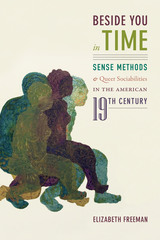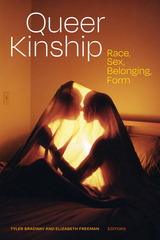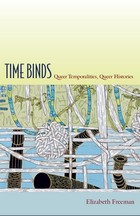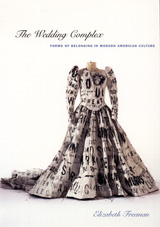4 books about Freeman, Elizabeth

Beside You in Time
Sense Methods and Queer Sociabilities in the American Nineteenth Century
Elizabeth Freeman
Duke University Press, 2019
In Beside You in Time Elizabeth Freeman expands biopolitical and queer theory by outlining a temporal view of the long nineteenth century. Drawing on Foucauldian notions of discipline as a regime that yoked the human body to time, Freeman shows how time became a social and sensory means by which people assembled into groups in ways that resisted disciplinary forces. She tracks temporalized bodies across many entangled regimes—religion, secularity, race, historiography, health, and sexuality—and examines how those bodies act in relation to those regimes. In analyses of the use of rhythmic dance by the Shakers; African American slave narratives; literature by Mark Twain, Pauline Hopkins, Herman Melville, and others; and how Catholic sacraments conjoined people across historical boundaries, Freeman makes the case for the body as an instrument of what she calls queer hypersociality. As a mode of being in which bodies are connected to others and their histories across and throughout time, queer hypersociality, Freeman contends, provides the means for subjugated bodies to escape disciplinary regimes of time and to create new social worlds.
[more]

Queer Kinship
Race, Sex, Belonging, Form
Tyler Bradway and Elizabeth Freeman, editors
Duke University Press, 2022
The contributors to this volume assert the importance of queer kinship to queer and trans theory and to kinship theory. In a contemporary moment marked by the rising tides of neoliberalism, fascism, xenophobia, and homo- and cis-nationalism, they approach kinship as both a horizon and a source of violence and possibility. The contributors challenge dominant theories of kinship that ignore the devastating impacts of chattel slavery, settler colonialism, and racialized nationalism on the bonds of Black and Indigenous people and people of color. Among other topics, they examine the “blood tie” as the legal marker of kin relations, the everyday experiences and memories of trans mothers and daughters in Istanbul, the outsourcing of reproductive labor in postcolonial India, kinship as a model of governance beyond the liberal state, and the intergenerational effects of the adoption of Indigenous children as a technology of settler colonialism. Queer Kinship pushes the methodological and theoretical underpinnings of queer theory forward while opening up new paths for studying kinship.
Contributors. Aqdas Aftab, Leah Claire Allen, Tyler Bradway, Juliana Demartini Brito, Judith Butler, Dilara Çalışkan, Christopher Chamberlin, Aobo Dong, Brigitte Fielder, Elizabeth Freeman, John S. Garrison, Nat Hurley, Joseph M. Pierce, Mark Rifkin, Poulomi Saha, Kath Weston
Contributors. Aqdas Aftab, Leah Claire Allen, Tyler Bradway, Juliana Demartini Brito, Judith Butler, Dilara Çalışkan, Christopher Chamberlin, Aobo Dong, Brigitte Fielder, Elizabeth Freeman, John S. Garrison, Nat Hurley, Joseph M. Pierce, Mark Rifkin, Poulomi Saha, Kath Weston
[more]

Time Binds
Queer Temporalities, Queer Histories
Elizabeth Freeman
Duke University Press, 2010
Time Binds is a powerful argument that temporal and sexual dissonance are intertwined, and that the writing of history can be both embodied and erotic. Challenging queer theory’s recent emphasis on loss and trauma, Elizabeth Freeman foregrounds bodily pleasure in the experience and representation of time as she interprets an eclectic archive of queer literature, film, video, and art. She examines work by visual artists who emerged in a commodified, “postfeminist,” and “postgay” world. Yet they do not fully accept the dissipation of political and critical power implied by the idea that various political and social battles have been won and are now consigned to the past. By privileging temporal gaps and narrative detours in their work, these artists suggest ways of putting the past into meaningful, transformative relation with the present. Such “queer asynchronies” provide opportunities for rethinking historical consciousness in erotic terms, thereby countering the methods of traditional and Marxist historiography. Central to Freeman’s argument are the concepts of chrononormativity, the use of time to organize individual human bodies toward maximum productivity; temporal drag, the visceral pull of the past on the supposedly revolutionary present; and erotohistoriography, the conscious use of the body as a channel for and means of understanding the past. Time Binds emphasizes the critique of temporality and history as crucial to queer politics.
[more]

The Wedding Complex
Forms of Belonging in Modern American Culture
Elizabeth Freeman
Duke University Press, 2002
In The Wedding Complex Elizabeth Freeman explores the significance of the wedding ceremony by asking what the wedding becomes when you separate it from the idea of marriage. Freeman finds that weddings—as performances, fantasies, and rituals of transformation—are sites for imagining and enacting forms of social intimacy other than monogamous heterosexuality. Looking at the history of Anglo-American weddings and their depictions in American literature and popular culture from the antebellum era to the present, she reveals the cluster of queer desires at the heart of the "wedding complex"—longings not for marriage necessarily but for public forms of attachment, ceremony, pageantry, and celebration.
Freeman draws on queer theory and social history to focus on a range of texts where weddings do not necessarily lead to legal marriage but instead reflect yearnings for intimate arrangements other than long-term, state-sanctioned, domestic couplehood. Beginning with a look at the debates over gay marriage, she proceeds to consider literary works by Nathaniel Hawthorne, William Faulkner, Carson McCullers, Vladimir Nabokov, and Edgar Allan Poe, along with such Hollywood films as Father of the Bride, The Graduate, and The Godfather. She also discusses less well-known texts such as Su Friedrich’s experimental film First Comes Love and the off-Broadway, interactive dinner play Tony ‘n’ Tina’s Wedding.
Freeman draws on queer theory and social history to focus on a range of texts where weddings do not necessarily lead to legal marriage but instead reflect yearnings for intimate arrangements other than long-term, state-sanctioned, domestic couplehood. Beginning with a look at the debates over gay marriage, she proceeds to consider literary works by Nathaniel Hawthorne, William Faulkner, Carson McCullers, Vladimir Nabokov, and Edgar Allan Poe, along with such Hollywood films as Father of the Bride, The Graduate, and The Godfather. She also discusses less well-known texts such as Su Friedrich’s experimental film First Comes Love and the off-Broadway, interactive dinner play Tony ‘n’ Tina’s Wedding.
Offering bold new ways to imagine attachment and belonging, and the public performance and recognition of social intimacy, The Wedding Complex is a major contribution to American studies, queer theory, and cultural studies.
[more]
READERS
Browse our collection.
PUBLISHERS
See BiblioVault's publisher services.
STUDENT SERVICES
Files for college accessibility offices.
UChicago Accessibility Resources
home | accessibility | search | about | contact us
BiblioVault ® 2001 - 2024
The University of Chicago Press









